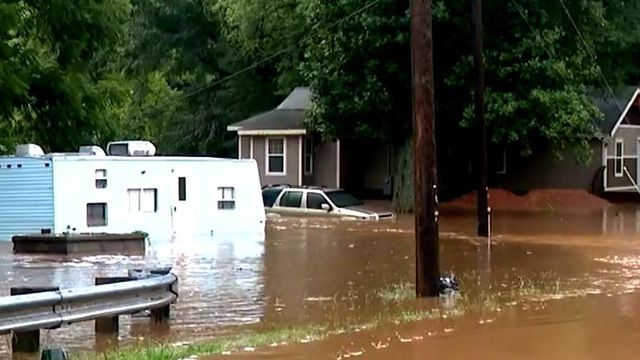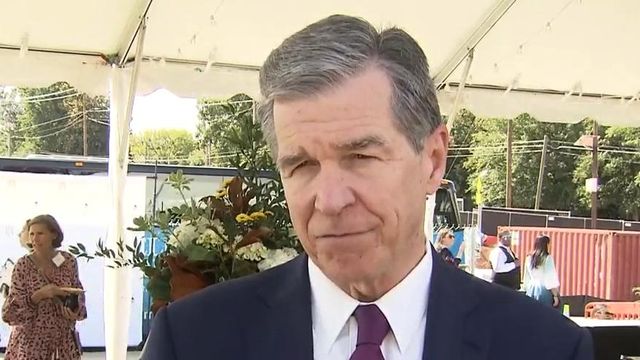North Carolina Gov. Roy Cooper issues state of emergency for Hurricane Ian
Speaking Wednesday about Hurricane Ian, Gov. Roy Cooper said the most seroius concern North Carolina has is flooding.
Posted — Updated“The most serious concern that we have is flooding, particularly the more west it moves,” Cooper told WRAL News during a Wednesday groundbreaking event in Raleigh. “We know the potential for landslides in the mountains, and we know from Tropical Storm Fred [in 2021] the devastation it can cause.”
The State Emergency Response Team is moving equipment around North Carolina to prepare for possible use depending on how Ian evolves as it moves north from Florida.
“It's also going to be important for us to move equipment around the state as the storm gets closer, and we will feel some impacts from a storm,” Cooper said. “We want to make sure that all of the equipment, vehicles and teams are positioned in the right place.”
The executive order waives the size and weight requirements for vehicles engaged in relief efforts before, during and after the severe weather. It includes power restoration and debris removal, as well as the transportation of goods like food, fuel and medical supplies.
Cooper's declaration allows for farm equipment to be moved out of flood-prone areas. The order also helps North Carolina’s agricultural sector by temporarily suspending weighing of vehicles used to transport livestock, poultry or crops ready to be harvested.
Also, Cooper authorized the activation of about 80 members of the North Carolina National Guard to assist as needed.
- Enabling government leaders to take extra measures to protect the public
- Triggering anti-price gouging laws
- Seeking state or federal funding aid for disaster response if it is warranted
A governor, local mayor, governing body of a municipality, county and General Assembly can declare a State of Emergency.
Cooper said it’s a big storm that will bring a lot of rain with it, and state leaders are continuing to track it.
The WRAL Severe Weather Team said rain could begin as early as Friday morning in North Carolina, but the heaviest rain will fall Friday night and all day on Saturday. Models call for 1 to 4 inches of rain in the Triangle and maximum guests between 35-40 mph.
Up to 5 inches of rain will be possible in coastal communities, with isolated totals reaching 10 inches.
The mountains of North Carolina near the Blue Ridge Parkway are also expected to experience heavy rain with the chance for landslides and up to 7 inches of rain.
Showers and thunderstorms are expected linger into Sunday and possibly Monday.
Cooper responds to criticism about state's disaster recovery from previous hurricanes
North Carolina has received about $780 million in federal assistance for storm recovery from Hurricane Matthew in 2016 and Hurricane Florence in 2018. Still years later, thousands of families are trying to get their homes rebuilt or replaced.
On Wednesday, WRAL News asked Cooper about people who are still unhoused from the previous storms.
“It is so important to get people back into their homes as quickly as possible, and this administration is committed to doing that,” Cooper said. “We've helped to rebuild roads, bridges and public buildings.
“We've gotten [more than] 10,000 people back into their homes. There's still work to be done. With the pandemic, there was some slowing down of the supply chain and construction. NCORR is moving to make some improvements to get people back into their homes as quickly as possible.”
Canton mayor recalls Tropical Storm Fred in August 2021
Canton Mayor Zeb Smathers recalled August 2021, when Tropical Storm Fred hit the Haywood County community hard.
"In the Canton community, we lost six people, [more than] 300 homes, lost our entire River District destroyed and lost my town hall, my police station and my fire station on top of, you know, the town pool or community center," Smathers said.
The last hurricanes to hit the western North Carolina mountains before that were in 2004. The remnants of Frances, Ivan and Jeanne crossed the Carolinas in the span of three weeks. It caused flooding and landslides. It marked the wettest month ever in the western part of North Carolina.
"The biggest difference between the floods of '04 and '21 was the intensity of the storm," Smathers said. "There were homes that got hit in '04 that got flooded.
"This time around, they do not exist. And when I mean do not exist, you could not find where that home was located. [The] foundation, every part of it, just gone."
"We can't replace those lives, but we are building back in amazing way," Smathers said. "However, we turn our eyes towards hurricane Ian and hopefully it's not, as Yogi Berra would say, 'Déjà vu all over again.'"
Related Topics
• Credits
Copyright 2024 by Capitol Broadcasting Company. All rights reserved. This material may not be published, broadcast, rewritten or redistributed.






